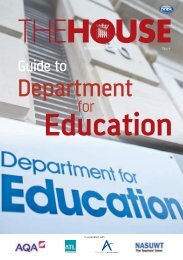Oracy
2fcBkno
2fcBkno
Create successful ePaper yourself
Turn your PDF publications into a flip-book with our unique Google optimized e-Paper software.
Fear of negative effects for pupils<br />
Pupils’ confidence<br />
There is a worrying tendency for pupils’ low confidence and<br />
ability in oracy to result in teachers avoiding oracy-based<br />
activities. Yet this does nothing but further exacerbate the<br />
problem resulting in a self-fulfilling prophecy.<br />
Secondary school practitioners are particularly concerned<br />
about talk-based activities negatively impacting on certain<br />
groups of pupils. Nearly a third (32%) fear that such<br />
activities might make shy or quiet pupils feel uncomfortable,<br />
and a similar proportion (29%) fear that they might lead<br />
to distraction or disruptive behaviour. These are both<br />
significantly higher proportions than in primary.<br />
“We just haven’t forced the kids to talk<br />
before. Kids who didn’t want to said, ‘I<br />
don’t know’ or ‘I’m shy’ and just didn’t<br />
ever have to do it, and suddenly they’re<br />
finding themselves being told, ‘no no,<br />
you’re going to do it’, ‘no no that’s not<br />
good enough, do it again’, and both<br />
students are reluctant to do that, but<br />
also teachers are a bit reluctant to go<br />
down that route of saying ‘no no,<br />
that’s not good enough, do it again’<br />
Andrew Fitch, Head of English & Director of Spoken<br />
Literacy Highbury Grove School<br />
Low confidence in oracy is a particular problem in secondary schools where teachers are significantly<br />
more likely than primary practitioners to say fewer than half of their pupils are confident sharing and<br />
articulating ideas with the teacher, other pupils, or presenting during lessons. Several teachers we<br />
spoke to suggest a reason for this may be that, at secondary, pupils are more likely to feel socially<br />
anxious. Unfortunately, while oracy presents opportunities to help these pupils overcome social anxiety,<br />
this anxiety can hamper pupils’ and teachers’ willingness to engage with such activities in the first place.<br />
What proportion of pupils do teachers believe are confident in the following<br />
areas? 906<br />
80%<br />
60%<br />
9%<br />
12%<br />
40%<br />
10%<br />
43%<br />
49%<br />
6%<br />
40%<br />
47%<br />
7%<br />
41%<br />
4%<br />
20%<br />
5%<br />
21%<br />
29%<br />
0%<br />
Asking<br />
questions to<br />
teachers about<br />
their learning<br />
Sharing their<br />
ideas verbally<br />
with a teacher<br />
Clearly<br />
articulating their<br />
ideas verbally<br />
with a teacher<br />
Sharing their<br />
ideas verbally<br />
with other<br />
pupils<br />
Clearly<br />
articulating their<br />
ideas verbally<br />
with other<br />
pupils<br />
Delivering<br />
presentations<br />
during lessons<br />
Clearly<br />
articulating their<br />
ideas when<br />
presenting<br />
during lessons<br />
All pupils<br />
Most pupils<br />
58




